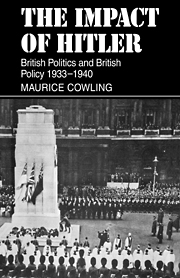Book contents
Eden, Churchill and their allies
Published online by Cambridge University Press: 19 October 2009
Summary
‘Let our first thought be of our duty to England. Let it be our desire and determination…that we shall so acquit ourselves that the name of England shall be honoured and respected. …England would wish, I believe, to see prevail throughout the world those conditions which she has tried and is trying to create in her own land, an equal opportunity for all to develop to the full their own individuality without let or hindrance. We have found that one essential condition of such progress is the rule of law. This being so, what must be our aim? We must first wish to see the rule of law between nations acknowledged. We must wish this because it is a condition of civilized life between countries. We must, therefore, also wish justice to be done by just means. This must make us readily accept, as trustees of a great part of the earth's surface, the duties of trusteeship, the need of understanding, of toleration, and of generosity. The England of to-day stands for something positive, the creation at last of a comity of nations in which each can develop and flourish and give to their uttermost their own special contribution to the diversity of life’.
Eden at annual dinner of the Royal Society of St George, Grosvenor House, April 26 1938, The Times, April 27‘I venture to send you a little book I have just published on much the same subject as your St. George's day speech, though you call it England and I call it Liberality’.
Murray to Eden, June 1 1938- Type
- Chapter
- Information
- The Impact of HitlerBritish Politics and British Policy 1933-1940, pp. 223 - 254Publisher: Cambridge University PressPrint publication year: 1975



